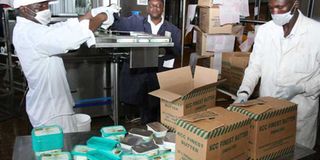Huge potential in milk processing yet to be tapped

New KCC has about 15,000 contracted farmers in Nakuru County. PHOTO | FILE
What you need to know:
- The county which is home to 1.6 million residents according to 2009 National population census has seen a steady rise in milk consumption and production
- Experts in the industry believe that Nakuru County has a bright future if the farmers made good use of the incentives
Nakuru’s dairy processing industry is consolidating with New KCC and Brookside emerging as dominant players.
But governor Kinuthia Mbugua believes that opportunities still exist for other players.
“We need more players to promote more competition”, he said during an interview with the Daily Nation.
He disclosed that the county administration had only recently managed to attract a new investor who will shortly be setting up in the Keringet area.
Irish investors have partnered with their local counterparts on this project.
The county which is home to 1.6 million residents according to 2009 National population census has seen a steady rise in milk consumption and production which has attracted several processors.
However, despite having such a favourable agriculture environment the dairy industry’s potential which is capable of creating thousands of jobs through value addition has remained untapped.
“Despite the prolific sector, much of the potential still remains untapped. The New Kenya Cooperative Creameries (KCC) Nakuru plant has an installed capacity of about 300,000 litres per day but only three per cent is utilised,” said New KCC Corporate Affairs Manager, Ms Stacy Too.
She said that if dairy farmers embraced the best agriculture practices they would deliver huge volumes of milk at the Nakuru factory and this would translate to an additional 250 new jobs.
She said with proper strategies, the idle capacity could be turned into real time key opportunities that can turn both local and national economic agenda.
The number of farmers delivering milk at Nakuru factory is 15,000 and includes individuals and cooperative societies.
Ms Too said that nearly three million kilogrammes of milk was delivered at the factory last year and this earned the farmers more than Sh300 million.
By the end of last month farmers had delivered 300,000kgs. The processor paid the farmers between Sh35 and Sh40 per kg.
And in a bid to attract more farmers, New KCC has provided the farmers with coolers, financial credit, farm inputs and feeds where the farmers repay through the check-off system.
“New KCC is committed to serving the daily farmers by offering them competitive prices and prompt payments,” added Ms Too.
BRIGHT FUTURE
Experts in the industry believe that Nakuru County has a bright future if the farmers made good use of the incentives from processors and tips from agriculture experts.
However, even as farmers venture into the industry, the expansion of human settlement in arable lands, milk hawking, unpredictable rain patterns and lack of best agriculture practices are some of the bottlenecks that may slow down the industry. Another leading processor in Nakuru County, Brookside has contracted 50,000 farmers.
According to the company’s General Manager in charge of milk procurement and extension services, Mr John Gethi, last year the company paid over Sh550 million to the farmers.
Mr Gethi said that one of the major challenges to efficient production was disease which has cut milk production and poor financial records maintenance.
“Apart from financial records, farmers should also keep event records of each animal including events such as calving immediately they occur,” said Mr Gethi.
In a bid to improve milk production in the region, Brookside had embarked on an ambitious programme to train farmers and had already set a demonstration centre at Rongai.
Most of the farmers said that lack of Artificial Insemination (AI), extension services and credit facilities were some of the hindrances to increased milk production.
“Our breeds produce less milk because we cannot afford the recommended services of breeders,” said Mr Douglas Kayayi, a farmer in Likia in Njoro sub-county.





